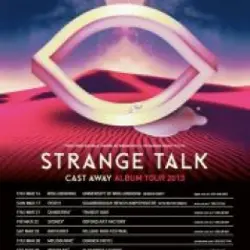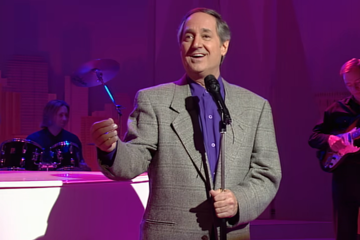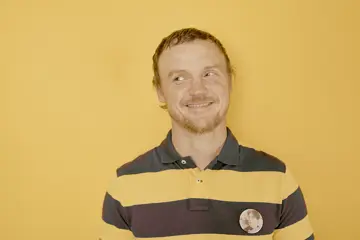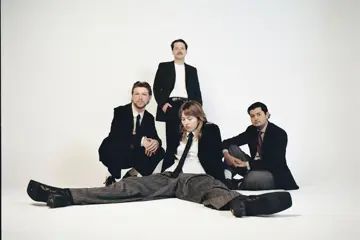 Strange Talk
Strange TalkThey couldn't have taken themselves any further away from the sort of urban heartland that spawned the genre from which Strange Talk draw inspiration than the two locations they chose to record their debut album, Cast Away, as singer, keyboards player and lapsed classically-trained violinist Stephen Docker admits. “Half of it was done in [a friend's farm in] country Victoria; and the other end of the spectrum, on the coast at Mount Martha, just near the beach. We were doing a lot of writing within the four walls of the [band's] Camberwell studio and I think we were getting a little bit stale and a little bit bored, and it was a learning process 'cause we'd never written anywhere else outside of that studio and the penny dropped for us 'cause it kind of helped us be more creative just having different surroundings for us and it was just a lot more relaxed.
“I guess a lot of bands say they head off and get in touch with their spiritual side or whatever the reason, but for us it was just a different location and it helped us craft where we were going. It's important if you get onto a roll that you finish it 'cause you might be in a completely different headspace the next day. That was definitely one of the key factors to help us finish this record.”
To say Strange Talk had already been experiencing a bit of a roll career-wise would be an understatement. They formed just over three years ago as an unlikely coalition between Docker, DJ/producer and bass player Gerard Sidhu; and two soul/funk musicians, guitarist Gillan Gregory and drummer Travis Constable. The lead track from their independent self-titled debut EP, 2011's Climbing Walls, hit the number one spot on the US industry magazine Billboard's Uncharted chart while the clip went viral, currently sitting at over 700,000 views on YouTube. Live, they've consolidated that with appearances at the Parklife, Stereosonic, Future Music, Soundscape and Falls festivals here and at gigs in New York in 2011 and last year's CMJ Music Marathon in LA, as well as scoring the support slot on the last Presets US tour. So it was time for Strange Talk to get stuck into working up their debut album, for which they then got Tony Hoffer (credits include Beck, The Temper Trap, The Presets and Ladyhawke) to mix at his Hollywood studio, The Sound Factory.
“Lyrically, a lot of it was just what we were feeling at the time and if you listen to the record, you can probably sense that there was some... I guess you can call [it] heartbreak,” Docker chuckles, “which inspired a lot of the lyrics, which obviously did happen to myself during the creation of the record. But we wanted to come across as real – we didn't want to come across like we were, you know, pulling jargon out of nowhere and just trying to make it work. We wanted to come across like we were telling a story and it was real. Technically speaking, when I write songs, love and emotion play a big part in my life and generally speaking that's what we write songs about.
Don't miss a beat with our FREE daily newsletter
“We were listening to a whole bunch of different music at the time but nothing really prompted the style or where we wanted to take it. Like, we just kind of sat down and thought let's just write some music and try and push some personal boundaries for ourselves rather than just stick with the sound we had on the first EP that we knew kind of worked for us. It was becoming, not too easy, but we wanted to challenge ourselves a little bit.”
This is why Gregory was allowed to let his “inner Brian May” loose on the album's big ballad track, Come Back Home. It's the last thing you'd expect from this electro-pop meets dance/club-oriented four-piece, though it's followed on the album by the pure club banger, Morning Sun.
“That's right,” Docker admits. “We gave him a key name and left him in the room. We just said, 'Just think Brian May. We're gonna grab a coffee and you can come up with the solo', and yeah, we came back about half an hour later and it was all tracked ready to go. That track was definitely a fun one to do.
“Come Back Home, the whole thing was new for us, when we were writing that song. The way we work, we get the instrumental working first and then we'll kind of write a song over the instrumental, so we'll have a rough structure with all the different synth sounds that we want to use and write lyrics over the top. But with Come Back Home, it was more challenging – we wanted to do something where it was literally just a piano and structured that song from the ground up. [We] wrote the song first and then 'electrified it up', I guess, at the end.
“I think the penny dropped with this record, being able to keep the raw organic sounds and mix them in with the synths and more electronic sounds. It shows in the live aspects as well because we don't tend to play the songs like they are on the record; we try to bring sort of organic appeal to the songs live. I mean, who wants to pay money to see a band play when you pretty much put the CD on? So we try and keep it exciting from a live aspect as well.”
It was performing in the US late last year that finally brought home to Strange Talk just how incredibly effective the internet has been in taking their music to the world.
“It's shown us how much the viral world really helps,” Docker admits. “We played a one-off show in LA before doing the CMJ festival and there was barely any press and it sold out, And people knew the words, they were singing along. You know, it was actually a really good feeling knowing that outside of Australia, our music is resonating. And it's led [us] now to start thinking about touring over there some more and getting outside of just, not only LA and New York and those bigger kind of cities but even the smaller parts, like Phoenix and the smaller kind of towns and I guess, getting the music out there as much as possible because, at the end of the day, the US is where it all happens – so we've been told; that's where a lot of bands are really trying to crack it. So yeah, it really goes to show that the social network and YouTube and all that kind of stuff is a really handy tool.”
Strange Talk will be playing the following dates:
Monday 4 March - Sub Bar, Deakin University, Warrnambool VIC















